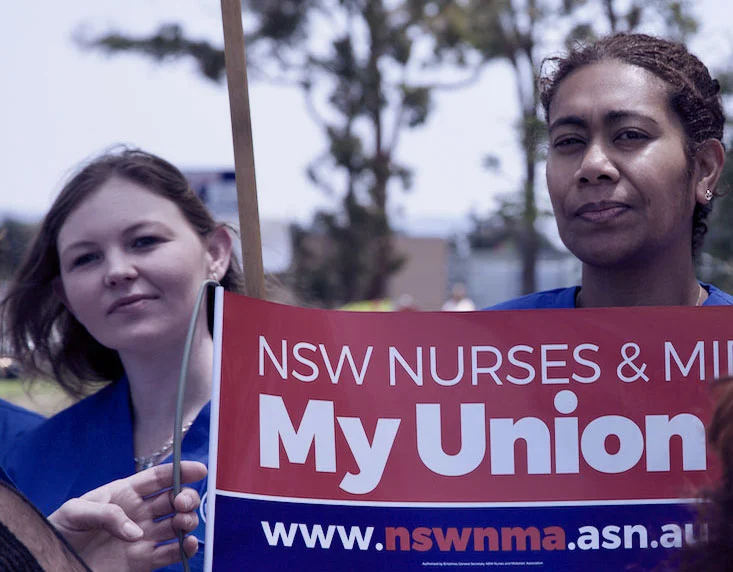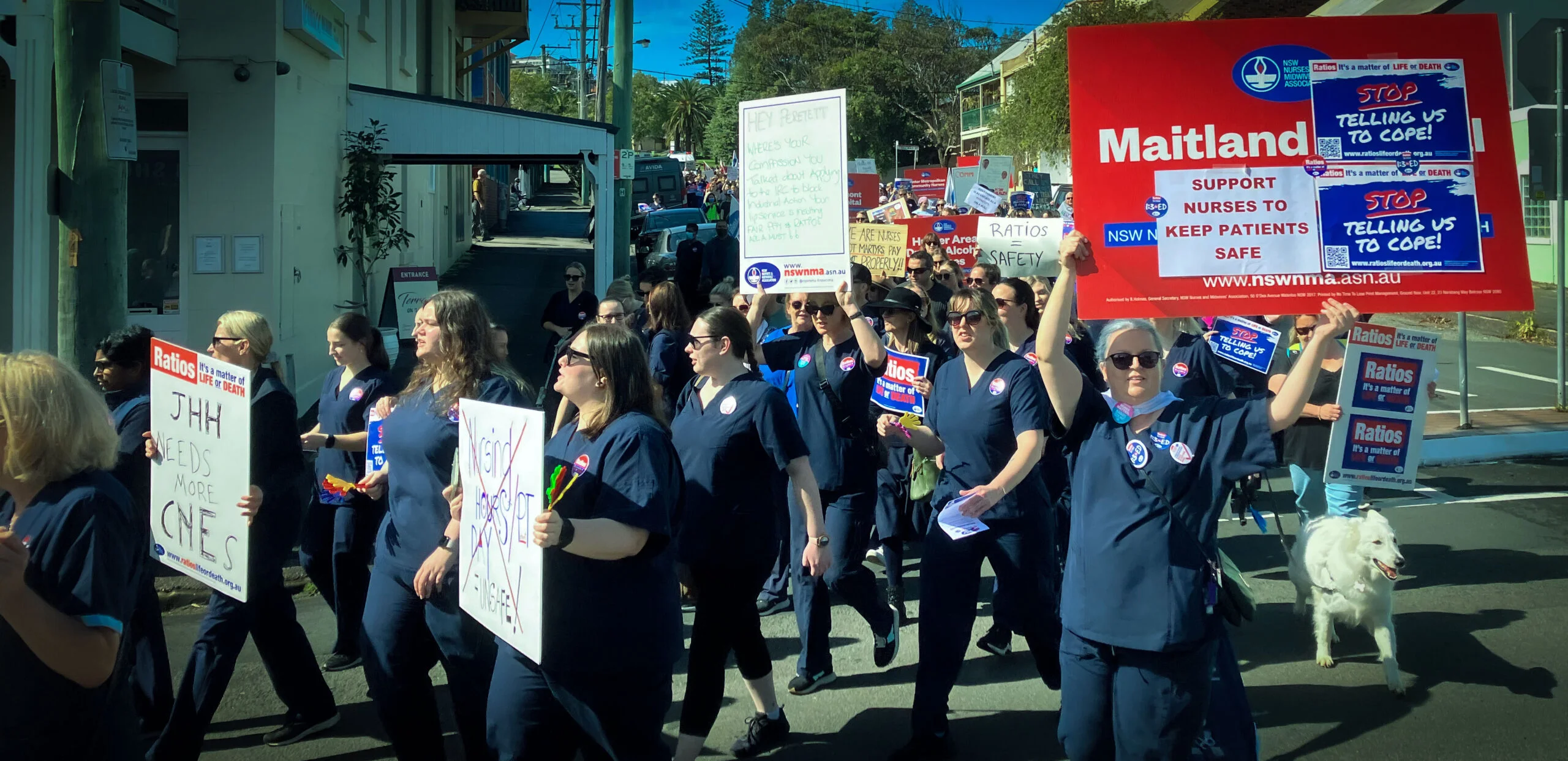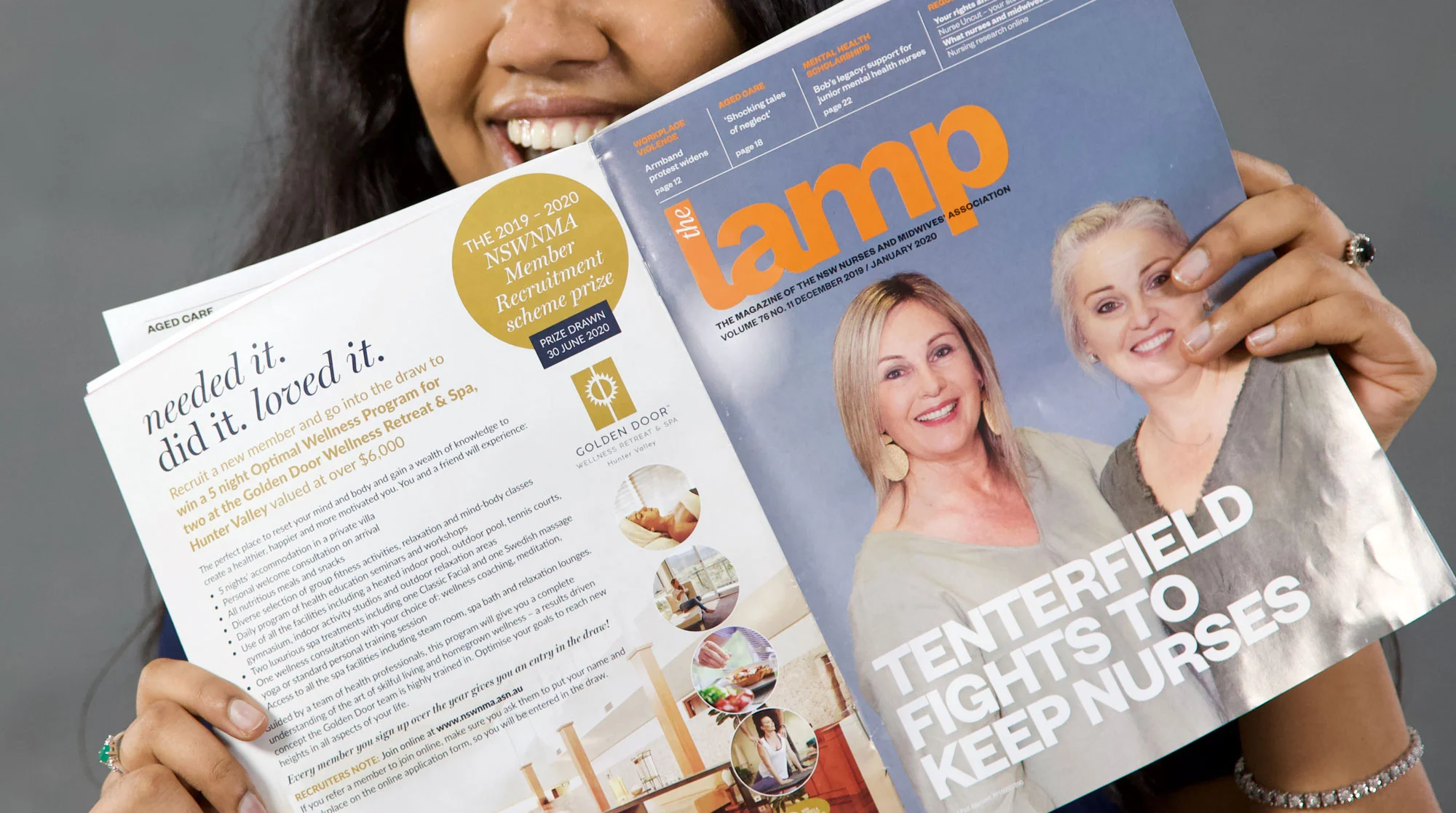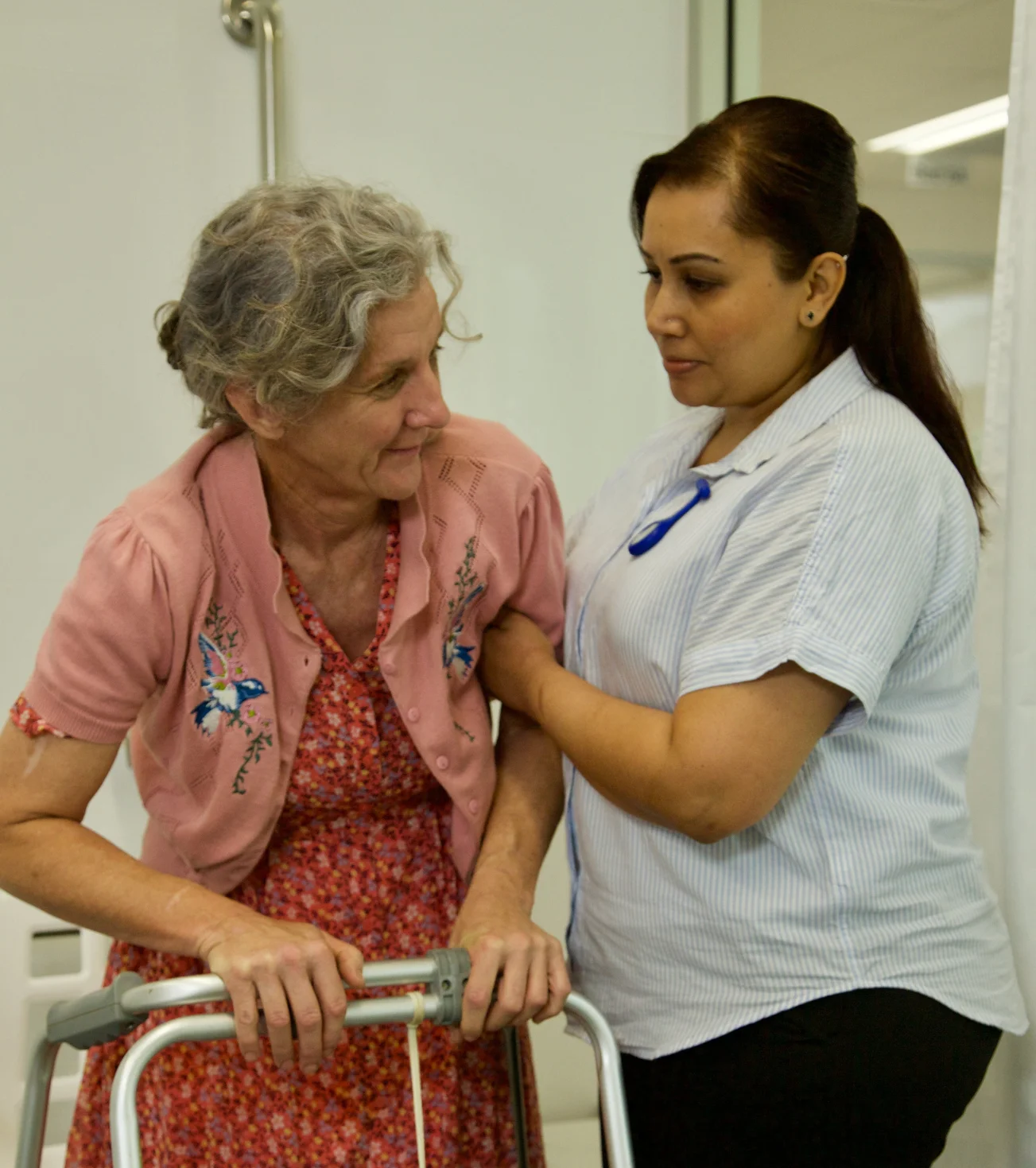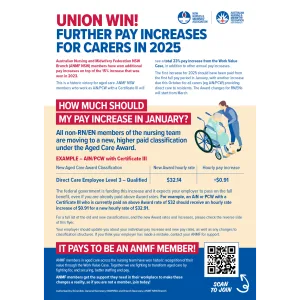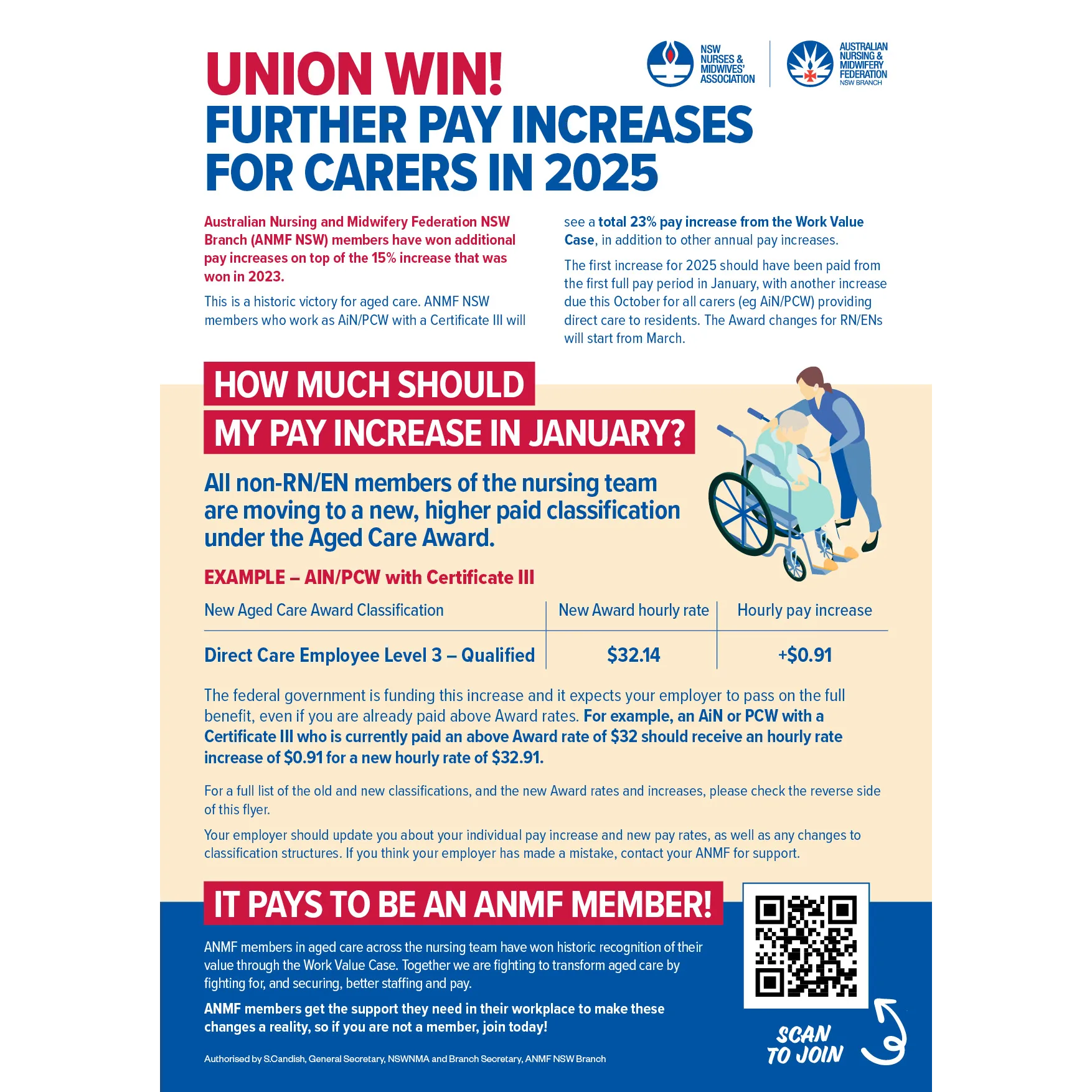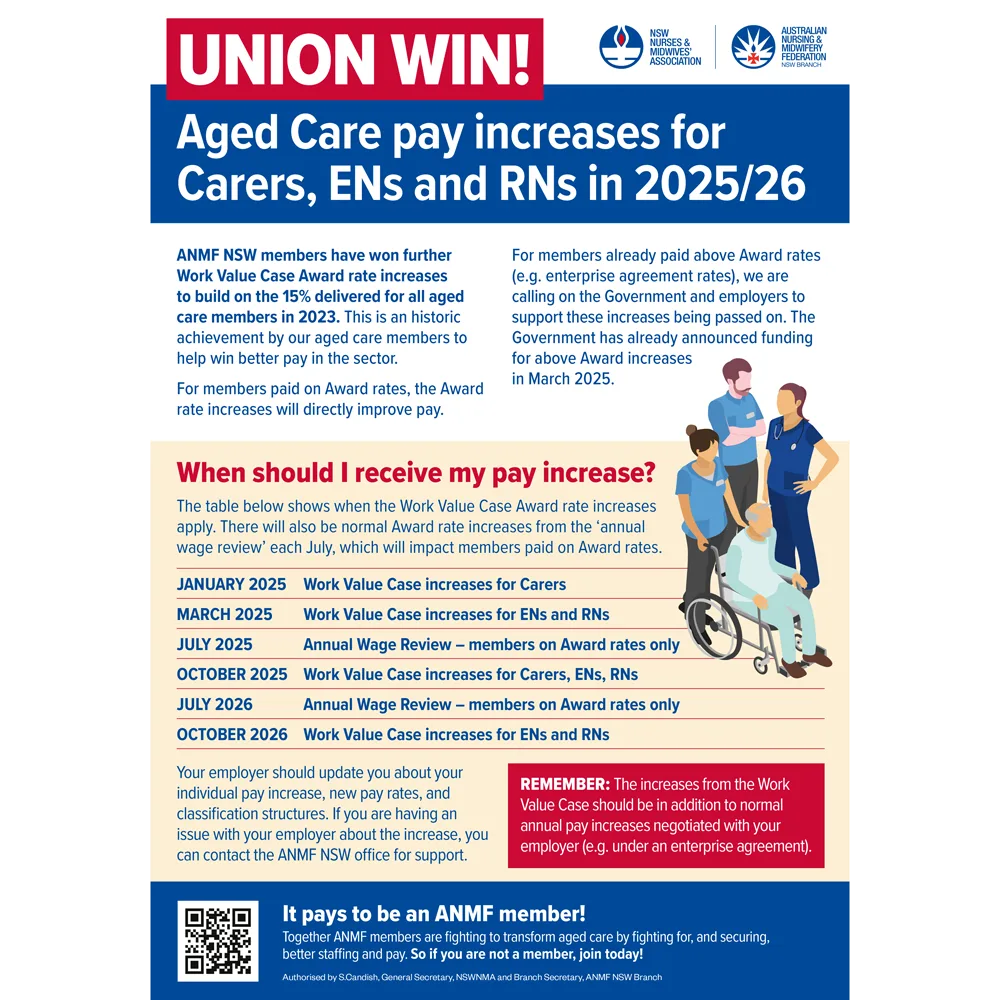A strong voice for Aged Care workers
The Association represents more than 11,200 workers employed in the residential aged care sector.
It is this collective strength that enables your union to fight for better pay and conditions for aged care workers. Together with members, we have secured some massive wins for the sector through persistent campaigning for better pay and conditions.
We will continue campaigning to ensure all these historic reforms are implemented so we can create a better aged sector for all aged care staff, residents and their families who deserve the best care.
Join your union and make sure your rights and conditions are protected.
Key reforms won by NSWNMA members
A registered nurse to on duty 24 hours a day in all aged care facilities by 2023 |
Federal government support for the NSWNMA and ANMF’s Fair work Commission application for a 25% pay rise for aged care nurses |
Introduction of a minimum of 215 minutes of care per day to be provided to residents, with 44 minutes of this care to be provided by a registered nurse |
Better food quality standards for aged care residents |
A guide on your aged care pay increases
In recognition of the long-term challenges facing aged care workers, the Association has been running a sustained campaign to reform aged care. We’re already seeing some of this work paying off with pay increases across the sector.
Pay increases for Assistants in Nursing, Carers and Personal Care Workers
Australian Nursing and Midwifery Federation (ANMF) NSW Branch members have been part of the collective effort that has secured better wages for aged care workers. This win is a testament to the power of standing united.
Last year, the Fair Work Commission (FWC) ruled that assistants in nursing (AINs), personal care workers (PCWs) and carers with a Certificate III qualification under the Aged Care Award will receive additional pay increases based on their classification. This comes on top of the 15% secured in July 2023.
The first increase will land on 1 January 2025, with any final adjustment coming on 1 October 2025.
As part of this Stage 3 ruling, the FWC has also restructured AIN, PCW and carer roles in the Aged Care Award, merging them into one classification – Aged Care Employees- Direct Care.
Check out our helpful guide here to understand the changes for PCW/AINs.
This Stage 3 pay rise should be paid to you by your employer as it is funded by the federal government, just like your Stage 2 pay rise. But we know that not all employers passed on the Stage 2 increases until members spoke up. So union members will once again need to hold providers to account – we’re here to help you do that.
The ANMF NSW will work with members to support this process, including checking payslips and helping raise concerns. We must ensure every workplace honours the increase so that you don’t miss out.
It’s vital you check your pay slip after you receive your first pay in January. If your pay isn’t right, speak up and hold your workplace accountable. You can begin to hold them accountable by contacting us via email: gensec@nswnma.asn.au
Unsure on how much your pay should have increased in January? Click on our guide below.
This pay rise is proof that collective union power delivers, celebrate this news.
Further Work Value Case increases for AINS, carers and PCWs will occur in October 2025 and we will be in touch with further information once available.
Don’t forget being part of ANMF NSW means you’re never alone. Together, we’ll continue fighting for fair pay, safer workplaces, and the recognition you deserve.
Not a member? It pays to be an ANMF member, click here to sign up to receive updates on this pay campaign.
Pay increases for Registered Nurses and Enrolled Nurses
Good news! As you may remember, at the end of last year, the ANMF’s Work Value case secured another historic Fair Work decision which will see RNs and ENs in Aged Care delivered another round of pay rises across 2025-2026.
This has reached another important milestone, with the government last week publishing its guidance for providers in implementing the RN and EN pay increases due in March 2025 and confirming it will once again fund employers to pass on this pay rise.
This ‘Stage 3’ increase is another significant win for members that builds on the 15% increase of July 2023, with additional increases due in March 2025, October 2025, and August 2026. For example, members at RN Level 1, Year 5, will receive an increase of $3.11 in the first full pay period after 1 March.
For more on the effect of the FWC decision, the government’s guidance, and how together we can raise our voice for a fair pay increase for all members, please read below.
The government guidance confirms additional funding will once again be provided to employers to support pay increases for aged care nurses.
The guidance includes tables showing the minimum increase that should be paid to each award classification.
These tables are based on the Fair Work Commission’s decision that increases pay but also compresses the Award classification structure.
This means that the percentage increases vary greatly by classification. Unfortunately, the effect of the FWC decision for ENs and RNs this time, is that workers on some levels do not stand to receive a pay increase in this March 2025 tranche.
For example, while we know that RNs with over 4 years experience will get a total of between 6.9 and 16.1%, the effect of the FWC decision is that in this March increase, RN Level 1 Year 8 and thereafter does not receive an increase.
To see the full pay increase schedule, please click here (see pages 8-12).
The government guidance leaves no doubt that your employer must consult with us on how it passes on the additional funding it receives.
Our message to providers is clear: it is not acceptable for some members to be left behind just because of their Award classification. Failing to pay an increase to some classifications could lead to nurses with more experience being paid less than their less experienced colleagues.
Providers must avoid this situation by paying all members a fair increase that maintains pay point progression for ENs and RNs.
ANMF NSW Branch members need to keep an eye out for further communication on how your employer proposes to pass on the Stage 3 increase to members.
Most levels do stand to receive an additional pay increase in this first tranche, and for those workers, the pay increase is due in the first pay period on, or after, 1 March, and backpay should apply if there is any delay.
Further Work Value Case increases for RNs and ENs will occur in October 2025 and August 2026, and we will be in touch with further information once available.
Not a member? Click here to sign up to receive updates on this pay campaign.
How staffing in your aged care facility should look
From October 2024, all aged care facilities will have a minimum 215 care minutes per resident per day with 44 minutes provided by Registered Nurses (10% of which could be delivered by Enrolled Nurses).
Join our Aged Care Campaign - let's fight for reforms in aged care!
Wanting to fight for a safer, more transparent aged care sector?
Sign up to be part of our aged care campaign.
Simply fill out this form and someone from the ANMF NSW Branch (NSWNMA) will be in touch.

Aged Care Wins
In recognition of the long-term challenges facing aged care workers, the Association has been running a sustained campaign to reform aged care. We’re already seeing some of this work paying off.
In partnership with the Australian Nursing and Midwifery Federation (ANMF), we’ve successfully lobbied the federal government to overhaul the sector, through both improvements to worker pay, and safer staffing measures across aged care settings.
In 2022, the ANMF and other unions submitted a landmark application to the Fair Work Commission (FWC) Aged Care Work Value Case callingfor a significant boost to the pay of aged care workers. A historic 15% interim pay increase was handed down and funded by the government in June 2023. This finally recognised the long undervaluation of employees in the aged care sector.
In mid-2024, the FWC awarded additional pay increases to Assistants in Nursing and Personal Care Workers, with some being awarded an increase of up to 23% (including the 15% increase from June 2023). Payments are set to begin in January 2025. More recently, the FWC has awarded a further increase to the minimum Award rates for Registered and Enrolled Nurses working in aged care. This decision concludes the 2020 national legal case initiated by the ANMF and other unions. Further details about these additional increases will be provided to members in 2025.
The Association formed a partnership with the Queensland Nurses and Midwives’ Union (QNMU) and the United Workers Union (UWU) to ensure employers are doing the right thing by workers. Employers have been legally obliged to comply with the new minimum award rates from the first full pay period on or after the 30 June 2023 under the Fair Work Act, meaning they must pass on every cent of the pay rise. Unions are committed to holding them to account.
To help strengthen these accountability efforts, the Association spends time in workplaces, meeting members and prospective members, hearing their concerns and uncovering local issues. Workers cannot simply rely on bosses to do the right thing, that’s why your union is here to support you.
The Association has long advocated for the interests of both members and the residents in their care. We understand nurses need greater support, and it starts with reforming the rules that govern this sector. Thanks to the sustained efforts of unions, in October 2022, federal parliament passed new aged care laws to increase the amount of direct-care that residents receive: 200 minutes including 40 from RNs – from 1 October 2023, and 215 minutes – including 44 from RNs – from 1 October 2024.
This measure, alongside the commitment to have a registered nurse onsite 24/7 from 1 July 2023, amounts to a $2.5 billion investment in aged care reform over four years.
The Association is working with other unions to ensure the government monitors and enforces these new requirements.
Click here to see how staffing in your aged care facility should look.
The Association, alongside the ANMF, UWU and others, has worked with the government to establish a unique Labour Agreement that helps address worker shortfalls. This includes special access rights to foreign workers who have been brought in to fill staff shortages, enabling an accelerated pathway to permanent residency. A Memorandum of Understanding introduces expanded labour market testing, meaning employers must offer local staff the maximum 76 hours of work per fortnight, before using overseas workers.
It also requires local workers to identify their desire for increased hours. The changes also ensure employers offer staff predictable rostering with set hours, decent wages and good working conditions.
These are big steps forward in meeting the shortfall of workers in aged care, and also ensure local workers currently deployed across the sector are given the best opportunity to develop a work schedule that suits their availability.
These improvements have been secured together and are because of the persistence of members over many years. There is still more work to do to continue improving outcomes for aged care workers. Together as a union, we are stronger. United, we can secure the changes needed to safeguard the aged care sector.


